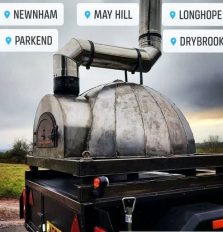Pepper’s Perfect Pizza’s First Steps
We love our private days with people wanting to set up their own woodfired pizza businesses and coming to learn the pizza ins and outs with us. Their enthusiasm and vision is infectious and none more so than we met Rachel and Matt last summer. We’ve kept in touch and it’s fantastic to see their fledgling business – Pepper’s Perfect Pizza – blossoming in Gloucestershire’s Forest of Dean despite an international pandemic going on. We took a few minutes to catch up with them and ask them how it’s going; here’s what they had to say –
Hi Matt and Rachel; great to catch up.Please tell us all about Pepper’s Perfect Pizza – how it came about and what the set up is.
The seed was sown with a visit to the Pig and Olive in Westward Ho! In 2018, we were so impressed, Matty simply had to build his own wood fired oven and then a course with David at Humble by Nature in September 2019 became the transition from ignorance to enlightenment. However Pepper’s Perfect Pizza would take another year. In July, whilst on holiday in Devon, our daughter Emily in true teenage style said “I’m bored and I have no money!” So Matty suggested she created a mini business using the wood fired oven selling pizzas to all the people in our Hamlet. She designed the logo, brochure, created the menu and did all the leafleting. On her first Saturday she was expecting to sell 20 pizzas, she sold 48, the second weekend was 52 and the third 49. She certainly wasn’t bored, it was hard work.

Then in September, Rachel was made redundant and so we decided to take a “Going Pro” course from Manna from Devon to see if we could actually make Pepper’s Perfect Pizza a real business. We also wanted to be different, there are a lot of horsebox operations which limit the size of your prep area and oven, plus all the other successful operators have a quirky set up such as an oven built in to a Land Rover for example and so we created the “time machine” which is a “steam punk” oven trailer which Matty built himself to keep costs down.
Choosing between a fully fitted trailer and gazebo/oven trailer is a big choice; trailers are obviously very convenient, you simply load up with ingredients and head out. A gazebo operation means you have to build and dismantle a field kitchen every single day you trade and they are not very weather proof, but they offer much more space and have much lower start-up costs. Another choice is the oven type, steel ovens are much lighter and ideal for a fitted trailer/horsebox, but they are only really effective for pizzas, if you want to be more versatile, a pre-cast refractory oven can do everything, they just weigh a lot. The Time Machine is built round a precast oven.
How many of you are involved in the production – it seems like a big team effort; how do you divide roles?
Like all food businesses there is more prep that cooking time, the week starts on Monday with admin and cleaning up, Tuesday to visit the wholesaler and supermarkets, then cooked ingredients on Wednesday (a good tomato base is your signature and everyone has an opinion, make it personal), and pulled ham is so much better than sliced ham. Dough making and fresh ingredients on Thursday and then dough balling, mozzarella slicing and final prep Friday and Saturday morning. On the night we have a team of four, one dough shaping, two placing toppings and one cooking, serving and running the show. Arguably you could reduce that with a dough rolling machine and one toppings person, but attention to detail with the toppings and pizzas that are not round is what makes the experience so authentic.

Any favourite pizzas coming to the fore as yet?
Hmmm the “Middle Eastern” with spiced lamb made from whole spices, red onion, feta cheese and topped with fresh mint is very popular; our favourite is the Super Food with slow roast aubergines, goats cheese, caramelised onion, pine nuts and a sprig of fresh rosemary… heaven!
What licenses/paperwork did you have to get in place before you could start trading and how did you choose your locations? Any issues with that process or was it all pretty straightforward?
Ahh street trading! Street trading is a “dark art”! Every council has different rules, they have the notion of permitted sites (these are your traditional road side pitches) and consented roads and prohibited streets. Everywhere regardless of whether it is private or not is consented in the Forest of Dean and so needs a license regardless; other councils like North Lincolnshire don’t require you to have a street trading license outside the permitted sites. However we did find our licensing officer was very helpful.
We have seven sites that we rotate on a four weekly basis, they are the larger villages of 150-300 homes with no take away services; there are larger towns/villages but we found their Parish Councils wanted to protect their current takeaway services nor did we want to compete in this arena. 
You need to identify your pitches first and get permissions from the owner; village halls are ideal for example, then it is best talking to the Parish Council first so they know what you are offering and the formal application from the Street Licensing team is not a surprise.
One Parish Council refused us at first because they thought we were a kebab van; it caused a furore with the local community and was the best marketing we could possibly have had! The PC backed down in the end 😊. Once you have applied for your license, there is a 28 day consultation period with the PC’s, Police and Highways Dept. and provided no objections are raised, your license is issued. Of course you need to register with the Environmental Health Office straight away (although you don’t need a food hygiene rating to trade) and you must have public liability insurance,
Any disasters and what are you particularly pleased with/proud of?
Power and Light, cooking by torch light is not easy, over estimate your power needs and come up with a solution that works all night, we started with leisure batteries and inverters but switched to a suitcase generator. Spend good money on concertina tables, they are at working height and don’t break your back and it can get very cold in winter which freezes your staff and makes the dough difficult to work with if you don’t plan for it.
Our best disaster was doing a Thai night when we were testing the Gazebo operation and discovering that Thai Jasmine rice is not like Basmati rice and doesn’t like being cooked in bulk – there was a lot of running around with dozens of saucepans on hobs cooking 500g at a time. Other minor disasters were when customers turn up thinking they’d ordered by saying ‘but you saw the whatsapp message’!! That threw me a bit!! We are now in the process of buying an App that manages all the orders – orders coming in via messenger, whatsapp, text, voicemail and telephone has lead to a few hiccups! We did make their pizzas though.
Proudest moment was delivering our night in the village where the Parish Council refused us at first: it was a raging success!!
Plans for the future – starting in a pandemic and lockdown surely there’s nothing you can’t do now!!
The great debate! Matty wants to stop doing his stressful job at some point and run his own pizza territory, Rachel thinks he’s stupid 😉 120 pizzas a night, two nights a week 48 weeks a year keeps you just below the VAT threshold, always an interesting consideration. Come the summer, it would be lovely to give back to our communities and run sessions with school children and Scout groups where they learn to make wood fired pizzas.
Awesome; thanks so much both and great to hear from you – can’t wait to see how you get on!!

